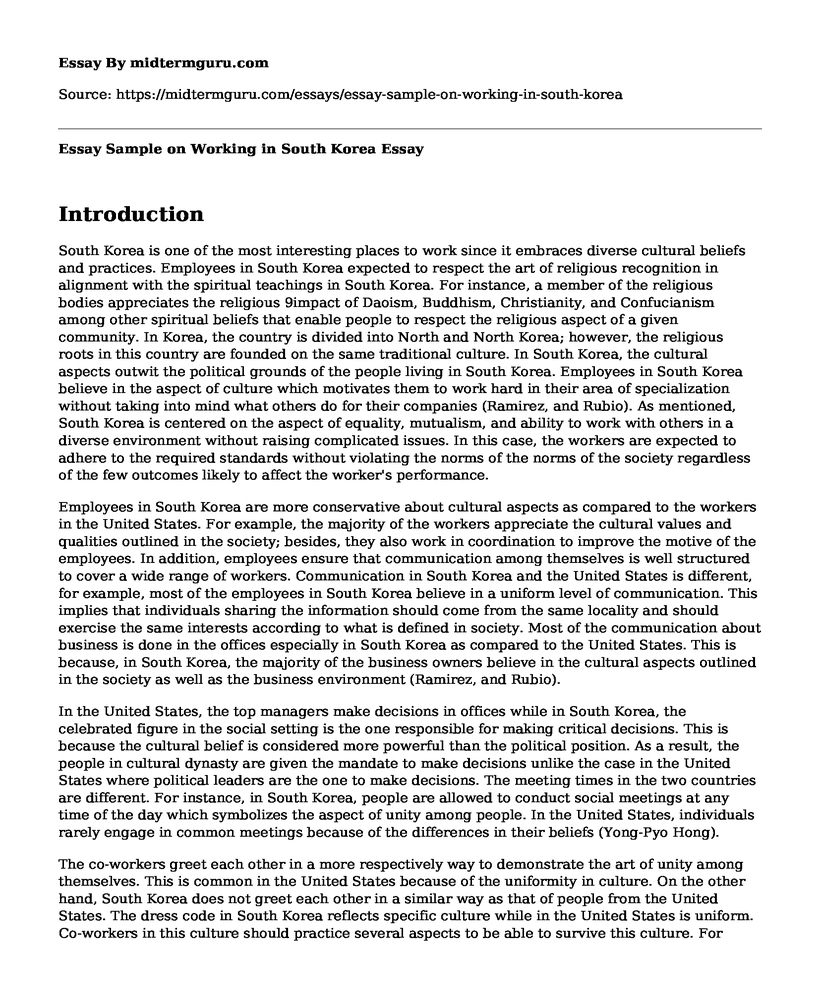Introduction
South Korea is one of the most interesting places to work since it embraces diverse cultural beliefs and practices. Employees in South Korea expected to respect the art of religious recognition in alignment with the spiritual teachings in South Korea. For instance, a member of the religious bodies appreciates the religious 9impact of Daoism, Buddhism, Christianity, and Confucianism among other spiritual beliefs that enable people to respect the religious aspect of a given community. In Korea, the country is divided into North and North Korea; however, the religious roots in this country are founded on the same traditional culture. In South Korea, the cultural aspects outwit the political grounds of the people living in South Korea. Employees in South Korea believe in the aspect of culture which motivates them to work hard in their area of specialization without taking into mind what others do for their companies (Ramirez, and Rubio). As mentioned, South Korea is centered on the aspect of equality, mutualism, and ability to work with others in a diverse environment without raising complicated issues. In this case, the workers are expected to adhere to the required standards without violating the norms of the norms of the society regardless of the few outcomes likely to affect the worker's performance.
Employees in South Korea are more conservative about cultural aspects as compared to the workers in the United States. For example, the majority of the workers appreciate the cultural values and qualities outlined in the society; besides, they also work in coordination to improve the motive of the employees. In addition, employees ensure that communication among themselves is well structured to cover a wide range of workers. Communication in South Korea and the United States is different, for example, most of the employees in South Korea believe in a uniform level of communication. This implies that individuals sharing the information should come from the same locality and should exercise the same interests according to what is defined in society. Most of the communication about business is done in the offices especially in South Korea as compared to the United States. This is because, in South Korea, the majority of the business owners believe in the cultural aspects outlined in the society as well as the business environment (Ramirez, and Rubio).
In the United States, the top managers make decisions in offices while in South Korea, the celebrated figure in the social setting is the one responsible for making critical decisions. This is because the cultural belief is considered more powerful than the political position. As a result, the people in cultural dynasty are given the mandate to make decisions unlike the case in the United States where political leaders are the one to make decisions. The meeting times in the two countries are different. For instance, in South Korea, people are allowed to conduct social meetings at any time of the day which symbolizes the aspect of unity among people. In the United States, individuals rarely engage in common meetings because of the differences in their beliefs (Yong-Pyo Hong).
The co-workers greet each other in a more respectively way to demonstrate the art of unity among themselves. This is common in the United States because of the uniformity in culture. On the other hand, South Korea does not greet each other in a similar way as that of people from the United States. The dress code in South Korea reflects specific culture while in the United States is uniform. Co-workers in this culture should practice several aspects to be able to survive this culture. For instance, to be flexible, precise, genuine, truthful and realistic. Other tips include honesty, appreciative, loyal and submissive (Yong-Pyo Hong).
Work Cited
Watson, Iain, and Hyoung-Wook Jeong. "Culture And Democratic Identity In South Korea: Contemporary Trends". Pacific Focus, vol 25, no. 3, 2010, pp. 376-395. Wiley,
Yong-Pyo Hong. "A "Culture Of Peace" For Sustainable Peace: Implications And Tasks In South Korea". Culture And Politics, vol 5, no. 2, 2018, pp. 5-30. Hanyang Peace Institute
Cite this page
Essay Sample on Working in South Korea. (2022, Oct 01). Retrieved from https://midtermguru.com/essays/essay-sample-on-working-in-south-korea
If you are the original author of this essay and no longer wish to have it published on the midtermguru.com website, please click below to request its removal:
- The Problem of a High Employee Turnover - Paper Example
- Teacher Career: Personal Statement
- Summary of Markel's Chapter on Writing Job Application Materials
- Paper Example on Trade and Labour Standards
- Lens Essay Analysis: "Heat, Work, and Genre" by J.A Lindstrom
- Annotated Bibliography on Career Development
- Talent Acquisition: Attracting & Retaining Skilled People for Long-Term Goals - Essay Sample







